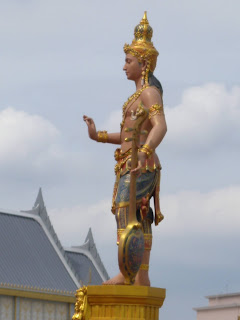Ven. Narada Thera (1898-1983) adapted from the old-timey translations in Everyman's Ethics: Four Discourses of the Buddha edited by Dhr. Seven, Ashley Wells, Pat Macpherson, Wisdom Quarterly


CONTENTS
- Sigalovada Sutra: The Layperson's Code of Discipline (DN 31)
- Great Mangala Sutta: Blessings (Snp, Verses 258-269)
- Parabhava Sutra: Downfall (Snp, Verses 91-115)
- Vyagghapajja Sutra: Conditions of Welfare (AN 54)
Parabhava Sutra: The Downfall Discourse
 |
| A celestial deva or "shining one" asks the Buddha. |
Thus have I heard. Once the Exalted One was dwelling at Anathapindika's monastery, in Jeta's Grove, near Savatthi.
When the night was far spent, a certain deity (deva, "shining one") whose surpassing splendor illuminated the entire Jeta Grove, came into the presence of the Exalted One and, drawing near, respectfully saluted him and stood respectfully to one side. Standing there, he addressed the Exalted One in verse:
Causes of Downfall
 |
| O, what karma has caused this?! (Machell) |
The Buddha: Easily known is the progressive, easily known is one who declines. One who loves Dharma progresses; one who is averse to it, declines.
The Deity: This much do we see: This is the first cause of one's downfall. Pray, tell us the second cause.
- [These lines again asking the question are repeated after each cause of downfall but have been left out for brevity.]
The Buddha: The wicked are dear to one, with the virtuous one finds no delight, one prefers the creed of the wicked — this is a cause of one's downfall.
Being fond of sleep, fond of company, indolent, lazy, and irritable — this is a cause of one's downfall.
Though being well-to-do, not to support father and mother who are old and past their youth — this is a cause of one's downfall.
To deceive by falsehood a Brahmin or wandering ascetic or any other mendicant — this is a cause of one's downfall.
To have much wealth and ample gold and food, but [out of miserly greed] to enjoy one's luxuries alone — this is a cause of one's downfall.
To be proud of one's birth, wealth, or clan, and to despise one's own kin — this is a cause of one's downfall.
To be a rake, a drunkard, a gambler, and to squander all one earns — this is a cause of one's downfall.
Not to be contented with one's own spouse, but to consort the spouses of others and prostitutes — this is a cause of one's downfall.
Though being past one's youth, to take a young spouse and to be unable to sleep for jealousy — this is a cause of one's downfall.
To place in authority a person given to drink and squandering — this is a cause of one's downfall.
To be of noble birth, with vast ambition yet slender means, but to crave for rulership — this is a cause of one's downfall.
Knowing well these causes of downfall in the world, the noble sage endowed with insight shares a happy realm.


















































































































































































































































No comments:
Post a Comment